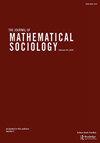Friend or Foe: A Review and Synthesis of Computational Models of the Identity Labeling Problem
IF 1.3
4区 社会学
Q3 MATHEMATICS, INTERDISCIPLINARY APPLICATIONS
引用次数: 3
Abstract
ABSTRACT We introduce the identity labeling problem – given an individual in a social situation, can we predict what identity(ies) they will be labeled with by someone else? This problem remains a theoretical gap and methodological challenge, evidenced by the fact that models of social-cognition often sidestep the issue by treating identities as already known. We build on insights from existing models to develop a new framework, entitled Latent Cognitive Social Spaces, that can incorporate multiple social cues including sentiment information, socio-demographic characteristics, and institutional associations to estimate the most culturally expected identity. We apply our model to data collected in two vignette experiments, finding that it predicts identity labeling choices of participants with a mean absolute error of 10.9%, a 100% improvement over previous models based on parallel constraint satisfaction and affect control theory.朋友还是敌人:身份标记问题计算模型综述与综合
我们引入身份标签问题——给定一个社会情境中的个体,我们能否预测其他人会给他贴上什么样的身份标签?这个问题仍然是一个理论缺口和方法论挑战,事实证明,社会认知模型经常通过将身份视为已知来回避这个问题。我们以现有模型的见解为基础,开发了一个名为“潜在认知社会空间”的新框架,该框架可以结合多种社会线索,包括情感信息、社会人口特征和制度关联,以估计最具文化预期的身份。我们将我们的模型应用于两个小图像实验中收集的数据,发现它预测参与者的身份标签选择的平均绝对误差为10.9%,比以前基于并行约束满足和影响控制理论的模型提高了100%。
本文章由计算机程序翻译,如有差异,请以英文原文为准。
求助全文
约1分钟内获得全文
求助全文
来源期刊

Journal of Mathematical Sociology
数学-数学跨学科应用
CiteScore
2.90
自引率
10.00%
发文量
5
审稿时长
>12 weeks
期刊介绍:
The goal of the Journal of Mathematical Sociology is to publish models and mathematical techniques that would likely be useful to professional sociologists. The Journal also welcomes papers of mutual interest to social scientists and other social and behavioral scientists, as well as papers by non-social scientists that may encourage fruitful connections between sociology and other disciplines. Reviews of new or developing areas of mathematics and mathematical modeling that may have significant applications in sociology will also be considered.
The Journal of Mathematical Sociology is published in association with the International Network for Social Network Analysis, the Japanese Association for Mathematical Sociology, the Mathematical Sociology Section of the American Sociological Association, and the Methodology Section of the American Sociological Association.
 求助内容:
求助内容: 应助结果提醒方式:
应助结果提醒方式:


